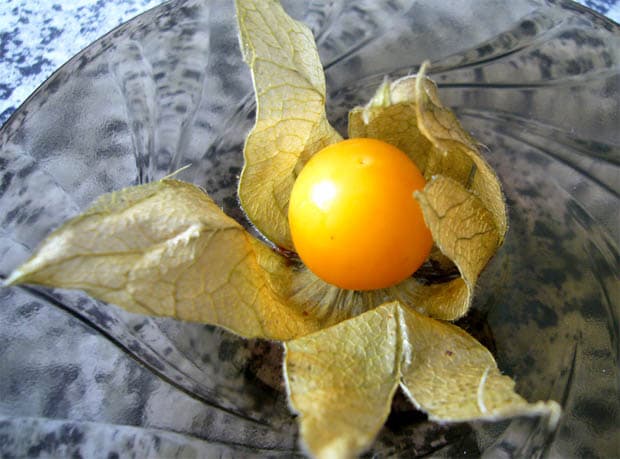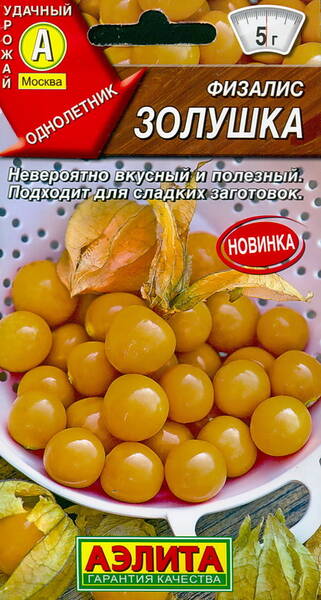The berries taste like strawberries, raspberries and pineapple at the same time.
An early ripening variety of strawberry physalis with abundant and long-term fruiting. This is an annual crop with fruits and berries enclosed in “paper lanterns” made of sepals.
The plants are erect, 40–50 cm high in open ground (1.0–1.1 m in a greenhouse), resistant to a range of unfavorable conditions. The bushes are spreading and do not need shaping. The small size of the fruits is compensated by their incredibly large number.
The berries weigh 3.0-5.0 g, are dense, juicy, very tasty when eaten fresh, and are suitable for various homemade preparations. For example, for an unusual dessert - physalis raisins: ripe fruits are dried in the sun for 2-3 days or in the oven for 30-40 minutes.
Physalis is a heat-loving plant and does not tolerate stagnant moisture. Seedlings dive in the phase of 1-2 true leaves. When planting seedlings, the plants are buried down to the first true leaf; support is desirable. It is not recommended to plant after other nightshade crops (tomato, pepper, eggplant, etc.), this will significantly reduce the productivity of the variety. In greenhouse conditions, it allows you to get 2.4-2.7 kg/m2.
1.0 g = 900-1000 seeds.

Physalis is very responsive to feeding with organic and mineral fertilizers, loves watering very much. He loves sunny places, well-fertilized soil. Since its fruits develop in the so-called "lanterns", they can withstand lower temperatures than tomato. But, if the plant is planted in a secluded place and covered on cool nights, then it will delight you with its splendor and beauty.
Physalis is very beautiful at the end of July, but if you want to try its fruits, then at the beginning of August you need to "destroy" all the beauty, that is, cut off all the flowers, and make sure that the plant does not give new flowers. Physalis fruits are located in internodes, they do not ripen at the same time. The size of the fruit can reach 4 cm in diameter, ripe fruits are yellow (may be purple). They can be eaten raw, but the taste is specific.
If you want to store physalis for some time, then do not remove the covers.
Physalis fruits are well suited for processing: salting, pickling. They also make jam and candied fruits.
For processing, it is necessary that the fruits lie down and turn yellow after collection. Only then can they be removed from the bags and recycled.
It is better to crush them or turn them into a homogeneous mass. For 1 kg of physalis mass, 1 kg of sugar, and then boil it until jam or jam or jelly is ready - it's a matter of your taste.
Experiment and please yourself and your loved ones!
Eng.: Golden Berry, Cape gooseberry.















